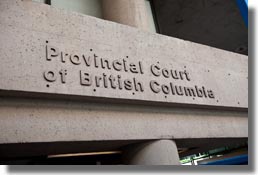The Court Ordered Sales Process

Court Ordered Sales
This introduction on foreclosure properties in BC will give you some insight into the process of buying a property by way of a Court Ordered Sale, including some of the risks involved. We realize that this is not a “how to” for Court ordered sales; rather, it is an overview of the various components of the process.
What is a Foreclosure Property?
When a property owner is unable (or unwilling) to repay a mortgage on a property, a lender can apply to the BC Supreme Court for the right to sell that property and recover its investment. Through the foreclosure process the lender can apply for and receive “Conduct of Sale” that will give it control of the sale process and allow it to list the property for sale with a Realtor, market the property and solicit offers. The process is very specifically regulated by the Court, and any ultimate agreement to sell the property must be approved by the Court. These sales are referred to as foreclosures, or Court Ordered Sales.
The Selling Price
As with most other property offerings the terms and conditions of a Contract of Purchase and Sale, including the ultimate sale price, is usually negotiated between the Vendor (lender) and a Purchaser. Having said this, the Lender still has an obligation to be able to show the Court that any sale is based on fair market value and that the property has been adequately and broadly marketed.
Once the Vendor and Purchaser agree to the terms and conditions of a purchaser agreement on a foreclosed property, the sale process is far from being done.
Subject Conditions
An accepted offer on a property, subject to a Court Ordered sale process, can include purchaser’s subject conditions such as due diligence, appraisal, inspection, financing, etc. These sorts of conditions are typical in most real estate transactions and are always recommended so that a purchaser can make an informed decision. A deal, though, also needs to be subject to approval by the Court. The Court approval condition is a third party condition that can only be set in motion once the purchaser’s conditions have been fully satisfied and waived.
Once the contract is non-conditional on the Purchaser’s part, an application can be made for Court approval. A hearing date is set and the parties prepare for approval.
As Is, Where Is
It is important to note that properties subject to foreclosure and the Court ordered sale process are sold “as is, where is”. Since the vendor is the lender of the property (and not, in fact, the property owner), it cannot be expected to be knowledgeable about the property to the extent that it can make various disclosures, representations or warranties as to the state and condition of that property. In other words, as a prospective purchaser, it’s a very good idea to retain the appropriate experts to undertake due diligence for things such as zoning and development potential, building condition, financing, environmental condition and other relevant inspections. Once the sale is non-conditional (and assuming it is approved by the Court), there is no turning back.
Application
Once there is a non-conditional agreement between the lender and the purchaser (subject only to Court approval), the solicitor for the lender will schedule a hearing date for the application to be heard by the Court. Applications are typically accompanied by affidavits or reports from the lender, Receiver (where applicable), the Realtor and other parties familiar with the file, that would outline the history of the file, the outstanding balance of the loan, any efforts to collect outstanding balances and marketing efforts that will have been undertaken in order to sell the property for the highest possible price. Depending on the nature of the asset these reports can also include an appraisal and other supporting documentation. The objective of this information is to ensure that the Court is supplied with sufficient background so as to satisfy itself that the proposed sale is, indeed, indicative of fair market value; having been marketed in a comprehensive and generally acceptable fashion. A hearing is typically within 14 days of the application being made to the Court.
Public Disclosure
An interesting (and sometimes exciting) aspect of the Court approval process in British Columbia is that all of that information supplied to the Court as part of the application process to the Court is available for public scrutiny. The agreed upon sale price will be made public in order to ensure a fair and transparent approval process. Others who have expressed interest in the property will typically have the ability to attend the hearing and observe the proceedings, and even submit competing offers. This means that, unlike the conventional property purchase process, the prospective purchaser with the accepted offer on the property is not necessarily the party who will walk away as the new owner. The hook is though, that any new offers being presented to the Court at the hearing must also be non-conditional and be accompanied by a non-refundable (pending Court approval) bank draft or certified cheque.
The Court Process
On the determined Court date, representatives for the vendor and the purchaser (with the now subject-free contract) will attend court, along with any other interested parties or prospective buyers who wish to submit an offer on the property to the Court. In some cases, no new buyers will present themselves in court. In other cases, we have seen multiple offer scenarios develop before our eyes.
If other parties do show up, they will typically be required to submit an offer in a sealed envelope for consideration by the Court. The new offer will obviously need to be higher than the agreed upon sale price between the seller and the original buyer. While this scenario might appear to provide an unfair advantage to the newcomer, it is worth noting that the Court will always allow the original purchaser to revise its offer, if desired.
Reviewing the Offers
The Court will consider all of the information before it in making a decision on the approval of an offer. If there are multiple offers the Master (Judge), will then open the offers and will review them… and typically, choose the highest bid. It is important to note that the highest offer on paper might not always be the best offer as the Court will also often take into consideration the amount and status of the deposit, the proposed completion date and other factors that might impact the transaction.
Occasionally, the judge might decide that none of the offers are worthy of approval. This might be the case if, for example, the underlying owner is able to convince the Court that the offer(s) is in fact, below market value or if the Court determines that the property has not been sufficiently exposed to the market.
Approval
When the deal is approved, the Court will issue what is known as a “Vesting Order”. The order is the approval by the Court and it provided instruction to the Registrar to effect the transfer of the title of the property to the successful bidder. The Vesting Order also serves to extinguish any and all financial encumbrances that could limit the new owner’s rights under the title. The Vesting Order will not extinguish encumbrances such as access easements, reservations of the Crown, restrictive covenants or other non-financial registrations on the title.
Always a Steal?
You might have heard of stories in the United States where buyers pick up a foreclosure property for pennies. You aren’t likely to come across such extreme stories like this in BC. However, there are often some great deals to be had.
While Court Ordered sales do need to reflect transactions at fair market value, it is important to bear in mind that properties sold via this process often have some sort of “hair” on them or a history that might make them more difficult to transact, develop or utilize. “Fair market value” might, in fact, reflect some sort of deficiency or other challenge such as soft market conditions (in the case of a development site). Prudent purchasers look for opportunities and can apply a creative approach where others might have simply run out of steam… or money.
Properties acquired through the Court Ordered sale process are perhaps the best examples of “buyer beware” in our real estate marketplace. Like all investments, though, there is a relationship between risk and reward. For an informed purchaser, the reward in getting a great deal on a prime property can often far outweigh the risk.
Researched and authored by: Alan L. Johnson of Colliers Unique Properties (604) 661.0842












